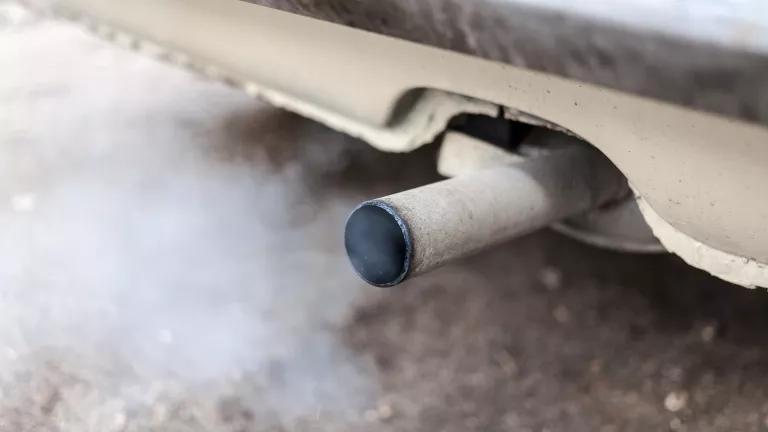Youngkin's Anti-Climate Attack on Clean Cars Hits Brick Wall
Virginia legislature reflects will of the vast majority of Virginians and blocks Youngkin's anti-climate assaults at every turn.

Less Air Pollution Ahead: Despite Gov. Youngkin's Hyper-partisan Crusade to Undo Climate Action, the Va. Senate Is a Brick Wall & Virginia's Clean Cars Air Pollution Law Stands
Alex Ishchenko/iStock
As the General Assembly wraps up its work today in Richmond—on the heels of one of the warmest, most climate-changed winters in Virginia’s history—there is cause to celebrate climate leadership inside Richmond’s Capitol building. Despite relentless attacks from hyper-partisan legislators who favor dirty, polluting fossil fuels, we held the line on major climate progress during the year’s legislative session.
Most notably, because climate leaders in the Virginia legislature—especially the Senate’s Natural Resources Committee—batted down this flood of attack bills and responded to disinformation about the law with the facts, Virginia’s landmark Clean Cars program remains the law of the land.
Under Virginia’s Clean Cars law, everyday Virginians will soon enjoy the fruits of the American auto industry’s critical transition to produce cheaper, cleaner electric vehicles (EVs). Virginians’ embrace of that industry-wide shift is vital to ensure that the Commonwealth maximizes the benefits associated with the transition to EVs. Just as everyone has a smartphone in their pocket, when no one did a decade ago, so too will electric vehicles be a common sight on our roads, and on new and used car lots across Virginia. Indeed, last year nearly 1 in 10 new vehicles sold in Virginia were electric. This growing consumer demand for better cars will continue to be met, owing to the Clean Cars statute’s requirement that sufficient EVs be available on new car lots across the Commonwealth to meet demand.
This legislative session saw the resounding rejection of legislation to undo Virginia’s popular and vital climate law, including the Regional Greenhouse Gas Initiative (RGGI). This shows that the Youngkin-led assault on climate protections is wrong on the facts, and wrong in his attempt to gain unseemly political capital by undermining environmental protections. Both RGGI and the Clean Cars program are proven, long-running climate action programs made law by our elected officials. And here in Virginia, they’re popular, which makes sense in a state where the threat of climate change is the second-biggest concern for independent voters.
The climate action train has left the station, regardless of whether Youngkin and pro-polluter allies are on board.
What protecting clean cars means for Virginians
Virginia’s Clean Car program ensures Virginians can get their hands on new electric vehicles that would otherwise go to other states. Virginia wisely chose for itself, along with 17 other states dealing with excessive air pollution from fossil-fueled tailpipes, a pollution measure that requires automakers send cheaper-to-drive, zero-pollution electric vehicles here to the Commonwealth—providing more customer choice to drivers
Under Virginia’s law, by 2024 about 8 percent of new vehicles sold– or just under 1 in 10 new cars on auto dealers’ lots – will be electric. That percentage increases each year thereafter (to about 1 in 5 new cars by 2025), to ensure Virginia’s ongoing increase in EV demand will be met with supply, slowly ramping up to 100% of new vehicles being sold in the Commonwealth being zero-emission in 2035. (The Clean Cars Law does not affect used vehicles, nor does it ever take vehicles away from drivers: that’s why even under the Clean Cars law, still just 1 in 5 cars driving roads in Virginia will be electric by 2035.)
That uptick in consumer access to EVs in Virginia mirrors the auto industry’s decade-long trajectory out to 2025. That final target date of 2035 is key, as that is the year by which many of the largest automakers (like GM, Chevy, Audi and Volvo) will be fully electric and no longer manufacturing gas-powered cars.
Despite the flood of false disinformation from antagonistic lawmakers this session, here are the real facts that climate leaders in the Virginia House and Senate understood as they defended the Virginia’s Clean Cars program earlier this year:
- Clean cars means lower-cost driving: Electricity is a vastly cheaper driving fuel than gas: in fact, about two-thirds cheaper. EVs are also a superior technology compared to overly complex and inefficient gas cars, with repair and maintenance costs just half that of “ICE” vehicles over the life of the vehicle. That cost savings will be even more dramatic starting with 2028’s cars, when most EVs will likely cost the same upfront sticker-price as gas-powered cars in new car lots, even without $7,500 federal rebates.
- Clean cars means more equitable driving: While Virginia’s Clean Cars program only applies to new vehicle delivery, the fact is that most people buy and drive used vehicles. By speeding up the delivery of new EVs into Virginia, we are also speeding their delivery into the used car market. That way, more folks living on lower wages can get to work at just a third of the cost of paying for gasoline. Under Clean Cars, about 1 in 5 cars driving Virginia roads will be electric over the next decade, a huge cost savings that will ripple across the economy.
- Clean cars means lower electric rates: By shifting our vehicle fueling payments away from gas stations and over to electricity providers instead, Clean Cars invests in the state’s electric grid. That, in turn, will eventually lower rates, as has already happened in two areas with the highest electric vehicle sales to date.
- Clean cars means cleaner air: Cars are a primary source of local air pollution across the country, as they create smog and release particulate matter (soot). The Clean Cars program will be a significant factor in improving local air pollution in Virginia over time, particularly around highly trafficked areas and highways.
- Clean cars means a safer planet: Virginia’s single-largest climate change contributor is car tailpipe pollution. Clean Cars’ slashing of tailpipe pollution through greater investment in EVs makes the law one of the single greatest advances against climate change the Commonwealth has ever taken.
The Clean Cars program was enacted by Virginians, for Virginians. It’s common sense: our Clean Cars law ensures all Virginians have cleaner air and stronger pocketbooks. As these benefits come into clearer focus as we approach 2024, lawmakers must stay on the right side of history by protecting Virginia from the increasingly serious impacts of climate change. That means continuing to stand up for RGGI and climate solutions like Clean Cars, even in the face of a Governor who opposes it.
If this past legislative session of 2023 is any guide to the future, Virginians can be assured that their elected officials in Richmond are doing precisely what Virginians want: protect climate progress.




